

![]()
This slideshow is an encore posting from our State of Inequality series.
[divider]
Elizabeth Fladung is a Brooklyn-based, CalArts-trained photojournalist. Her work has appeared in The Nation, La Repubblica, The Fader and Wax Poetics Magazine.
About one thousand Angelenos marched and rallied for a $15 minimum wage near downtown Los Angeles Wednesday. While several protests occurred at fast-food outlets and other locations across the city early in the morning, the main event began shortly before lunchtime, when demonstrators gathered at a McDonald’s located on Figueroa and 28th streets, and then marched to the Tommy Trojan statue on the University of Southern California campus.
Part of a nationwide Tax Day protest, L.A.’s Fight for $15 marchers included Walmart workers, members of California’s In-Home Health Supportive Services and part-time instructors from USC. One university activist named Maria told Capital & Main that she was a first-generation college student from a working class family. She claimed that USC is pitting the needs of students against raising the incomes and working conditions of part-time academic employees.
“Some faculty are not making ends meet —
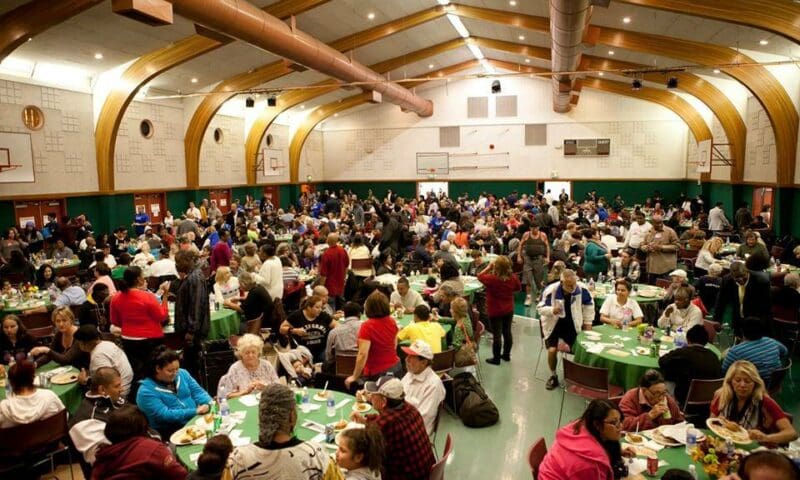

It’s a crisp, early morning at the Chatsworth Foursquare Church. A small number of people in worn jackets and winter gear is sitting in the parking lot. Several had awoken at 4 a.m. to leave their sleeping spot at the nearby train yards before security guards showed up for their shift.
This is an encore posting from our State of Inequality series.
A few minutes after nine, the pickup truck they’ve been waiting for arrives, towing a mobile shower unit that sports its provider’s name: The San Fernando Valley Rescue Mission. A middle-aged man with a full, silver mustache steps out of the truck and hands out hygiene items to the folks looking for a few minutes of hot shower.
“Eli is usually the guy who runs this unit, but I’m filling in for him today,” says Jim Real.


The latest legal assault on the right of the state’s public-sector unions to collect dues was filed in Los Angeles earlier this month by StudentsFirst, the Sacramento-based, national school-privatization organization.
The federal suit, Bain v. California Teachers Association, was brought on behalf of four California public school teacher union members who claim that the state’s current “fair share” rules infringe on their rights by forcing them to choose between paying for union-supported political causes with which they disagree or quitting the union. It seeks to bar unions from collecting dues money earmarked for political purposes as a condition of membership.
At stake are an estimated tens of millions of dollars — and a corresponding political clout — that unions stand to lose if the suit succeeds in making voluntary the 30 percent to 40 percent of dues that members currently pay for political activities.
» Read more about: StudentsFirst Sues Teachers Unions Over Dues »


Beth Fladung’s images of a food desert in the midst of the most productive agricultural land in the country.
![]()
This is an encore posting from our State of Inequality series [divider]
Elizabeth Fladung is a Brooklyn-based, CalArts-trained photojournalist. Her work has appeared in The Nation, La Repubblica, The Fader and Wax Poetics Magazine.


It happens every spring: The start of baseball season and the Chamber of Commerce’s assault on legislation designed to improve the lives of Californians – many of them our most vulnerable residents. The CalChamber lobbies against legislation year-round, of course, but brings out its biggest bat in the form of its Job Killer list – a lineup of bills that are demonized as wasteful, overreaching, unfair, etc. The list is a remarkably effective tool and accounts for the chamber’s astronomically high batting average – last year it went 25 for 27 in its efforts to stop “job-killing” legislation. Many a bill that seemed a shoo-in to become law has suddenly found itself permanently stuck in some committee, or vetoed whenever the Chamber persuades the governor to play the role of Mr. September for corporate interests.
Last week the CalChamber released its “preliminary” list of Job Killers.
» Read more about: CalChamber's 'Job Killers' List Returns »


There are many student cars parked at and around Sir Francis Drake High School — some of them expensive BMWs, some environmentally correct Priuses. But when Justice Levine attended classes at this Marin County school, she had to walk to Drake, passing rows of expensive San Anselmo homes. That was nearly seven years ago. Then 14, she would wake up in the morning to an empty house and make her own breakfast — her mother had already left for work for the day.
This is an encore posting from our State of Inequality series
Their rented home — one floor of a modest two-story house — was not well-furnished, most of its fixtures were secondhand and it lacked the semblance of interior decorating. Now 21, Levine describes it as a space she and her mother occupied separately for a long time,
» Read more about: In the Midst of Plenty: Food Stamps in Marin County »
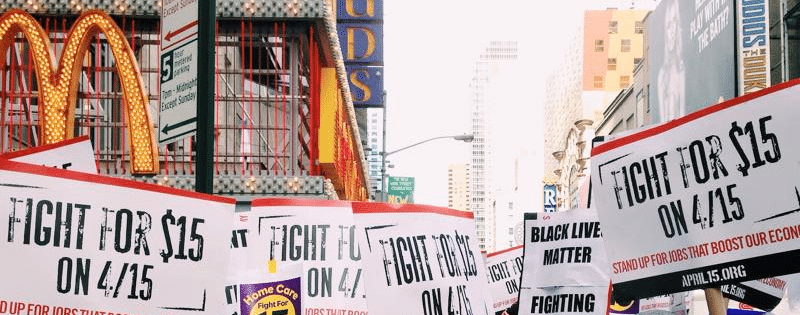
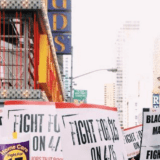
As President Obama’s efforts to nudge the U.S. minimum wage from $7.25 to $10.10 an hour continue to be rebuffed by a Republican Congress, a national coalition of low-wage fast-food and retail workers will be taking their demands for a doubling of the current wage to the streets on Wednesday, in what they promise will be “the largest low-wage worker strike in history.”
Kendall Fells, the organizing director for the Fight for $15 campaign, said the April 15, 200-city walkout will also include actions on about 170 college campuses around the country and abroad.
Wednesday’s one-day strike is part of a three-year campaign spearheaded by the Service Employees International Union and the AFL-CIO to build public support for raising the pay for fast-food and other low-wage workers, a boost that would lift about 12 million Americans above the federal poverty line of $23,850 a year for a family of four.
» Read more about: Minimum Wage Protests Planned for April 15 »


Click the right arrow button to go to the next slide.
[SlideDeck2 id=45066]
This is an encore posting from our State of Inequality series
[divider]
Elizabeth Fladung is a Brooklyn-based, CalArts-trained photojournalist. Her work has appeared in The Nation, La Repubblica, The Fader and Wax Poetics Magazine.
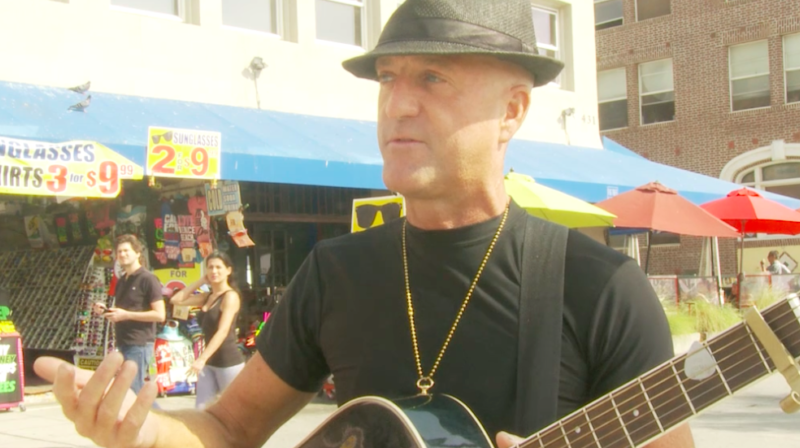

The chord progression of the Red Hot Chili Peppers’ song “Otherside” plays on the south end of the Venice Beach boardwalk. The middle-aged man strumming his acoustic guitar is Gary St. Germain, who spends afternoons performing songs in Venice, Burbank and Hollywood, a black pork pie hat always perched on his head. When he has free time, St. Germain plays in Venice for two or three hours at a time.
This is an encore posting from our State of Inequality series
“I don’t have an amplifier,” St. Germain says. “So I set up where there isn’t too much music blasting and I just play what I love.”
Ironically, the more busy days at Venice seem to benefit him less. It’s the days when curious people stroll by that St. Germain makes 20 to 40 dollars after a few hours. According to St.
» Read more about: The Way We Live Now: Singing for Supper »


As comprehensive immigration reform stalls along party lines in Washington, D.C., state Democrats are taking action in Sacramento. Backed by an assortment of coalition partners, California’s blue lawmakers have authored 10 new immigration bills (four in the Senate and six in the Assembly) to better the lives of two million undocumented individuals — five percent of California’s population.
As a thunderstorm with hail and lightning soaked a drought-parched Sacramento, Senate President Pro Tem Kevin de León (D-Los Angeles) and Assembly Speaker Toni G. Atkins (D-San Diego) announced the “Immigrants Shape California” reform measures. They would increase the consumer, civil, criminal, health-care and labor rights of undocumented households.
“We are doing the work of the federal Congress,” said de León during a late-morning news conference inside the state Capitol. “This is our reaction to their lack of action.”
“With these bills,” said Atkins, “California will show the practical, humane and forward-thinking leadership that can move the needle on a national discussion.” To this end,
» Read more about: Curtain Raised on State Immigration Bills »
Somerset Waters has the passion of a convert. You can hear it in his voice when he outlines why he set up the only worker-owned cooperative business in Los Angeles.
“It’s really exciting pushing the boundaries of how a small business can operate here,” he says, standing in front of a bank of solar panels outside a residence in Calabasas. “People want a sense of ownership at work, a feeling of justice, a real stake in their working lives.”
Last year, inspired by the Pioneer Valley Solar Co-Op in Massachusetts, and with guidance from co-op resource center LA WORCS, Waters created Pacific Electric, a worker-owned co-op, to see if a different kind of business model could take hold in Los Angeles.
The four-person union firm, which has plans for expansion to 100 owner-members, installs solar and other electrical systems for residential and business customers throughout Los Angeles County.
» Read more about: Workers of the World – Buy Your Own Company! »
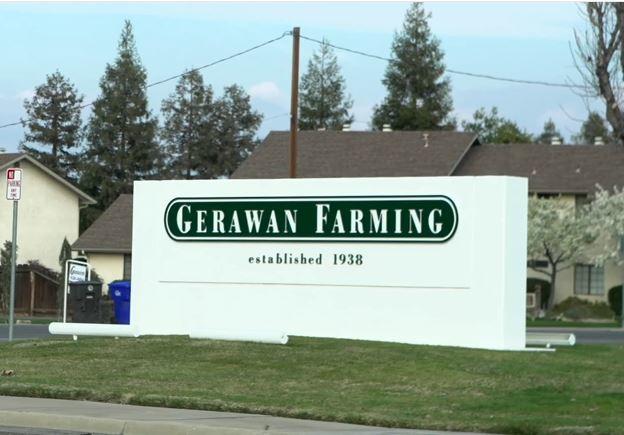

(Yesterday David Bacon examined a decades-long labor war being fought by Gerawan Farming against the United Farm Workers — a union against which the company has been accused of orchestrating a decertification campaign. His reporting concludes today with a look at Gerawan’s political allies and the company’s attempt to overturn a key California labor law.)
As this fight unfolds, national anti-union organizations are moving in. The far-right Center for Constitutional Jurisprudence joined the appeals case. In recent years the Center has joined the Harris v. Quinn suit against the Service Employees International Union in Illinois, sued the California Labor Commissioner on behalf of employers, argued for Hobby Lobby stores against providing birth control for their employees, and supported the initiative to end affirmative action in Michigan.
Furthermore, the Center for Worker Freedom, headquartered in the Washington, D.C. offices of Grover Norquist’s Americans for Tax Reform (ATR),
» Read more about: Conservative Groups Rally Behind Gerawan Farming »


Click the right arrow button to go to the next slide.

This is an encore posting from our State of Inequality series
[divider]
(Andy Warner’s comics have appeared in many places, including Slate, Medium, American Public Media, Symbolia, KQED, popsci.com and for the United Nations Refugee and Works Agency.)


When hundreds of people marched to the Los Angeles City Council last October, urging it to pass a resolution supporting a farm worker union fight taking place in California’s San Joaquin Valley, few had ever heard the name of the company involved. That may not be the case much longer. Gerawan Farming, one of the country’s largest growers, with 5,000 people picking its grapes and peaches, is challenging the California law that makes farm workers’ union rights enforceable. Lining up behind Gerawan are national anti-union think tanks. What began as a local struggle by one grower family to avoid a union contract is getting bigger, and the stakes are getting much higher.
The Gerawan workers got the City Council’s support and, on February 10, the Los Angeles Unified School District Board of Education passed a resolution that went beyond just an encouraging statement.
» Read more about: Growers Move to Gut California’s Farm Labor Law »


Click on the right arrow button to go to the next slide.
Data and research for this story were provided by Charlie Eaton of U.C. Berkeley’s Department of Sociology and DebtandSociety.org.

This is an encore posting from our State of Inequality series.
» Read more about: Affluent Private Universities Are Tax Shelters For the Rich »


Sometimes the conventional narrative the media tell about a news story feels so wrong I can’t stand it — but I don’t know why until the story’s over. The recent coverage of the labor dispute at the West Coast ports — including Los Angeles and Long Beach — is a case in point. News reports focused on the long, drawn-out negotiation process as an economic disaster waiting to happen, and blamed the entire situation on those dastardly workers and their unions.
The narrative included several key arguments: A union slowdown at the ports was causing a backlog of shipping containers carrying everything America buys, putting all importers at risk and causing a plague on American shoppers. There would be long-term economic damage to our region as a consequence. With the eventual opening of the widened Panama Canal, shippers would skip the West Coast and head to other ports.


 Capital & Main has confirmed that a proposed California law could upend existing minimum wage laws across the state, potentially rolling back wage increases for tens of thousands of people. If passed, the legislation could invalidate wage hikes approved by voters in some of the state’s largest cities, including San Francisco and Oakland. (See original story here.)
Capital & Main has confirmed that a proposed California law could upend existing minimum wage laws across the state, potentially rolling back wage increases for tens of thousands of people. If passed, the legislation could invalidate wage hikes approved by voters in some of the state’s largest cities, including San Francisco and Oakland. (See original story here.)
Assembly Bill 669 is backed by the California Restaurant Association (CRA) and is being championed by Assemblyman Tom Daly, a Democrat from the Orange County city of Anaheim.
The legislation’s target is tipped workers – under Daly’s proposal, the minimum wage for workers who receive tips would be capped at $9 if their total hourly compensation, meaning base wage and tips, is $15 an hour or more. If, for example, an Oakland waitress earns that city’s current minimum wage of $12.25 an hour,


(Editor’s Note: This is an encore posting from our State of Inequality series.)
March 1, 2060
Dear Granddaughter,
Just the other day, you asked me two questions that I failed to answer. How did California get into the fix it’s in today? And, a half century ago, when I was writing regularly about our home state, did anyone see this future coming?
I must confess the real reason for my evasion was that your questions reminded me of a document from those days that I couldn’t immediately put my hands on. It took me a week but I finally found it on a very old laptop computer I still hang onto. (I know, I know, I’m a dinosaur!)
This artifact is dated 2010, and it’s a map of sorts — not of a city but of a future.


Last month former San Jose mayor Chuck Reed took the first step toward offering a promised draft of a 2016 public pension cutting initiative that, he has hinted, will target the California Public Employees’ Retirement System. CalPERS manages the retirement and health benefits for more than 1.6 million California public employees, retirees and their families. Reed tried to get a pension initiative on the ballot in 2014, only to withdraw the measure when state attorney general Kamala Harris assigned it a ballot description that Reed and his allies believed would hurt their chances with the electorate.
This time, however, Reed could find his campaign in danger from an unexpected source – conservative allies who might be worried that his initiative’s very presence on the ballot will draw huge numbers of liberal and union voters – who would then also vote against conservative candidates running for local and state office.
» Read more about: Pension Cutters' 2016 Ballot Obstacle: Voters »